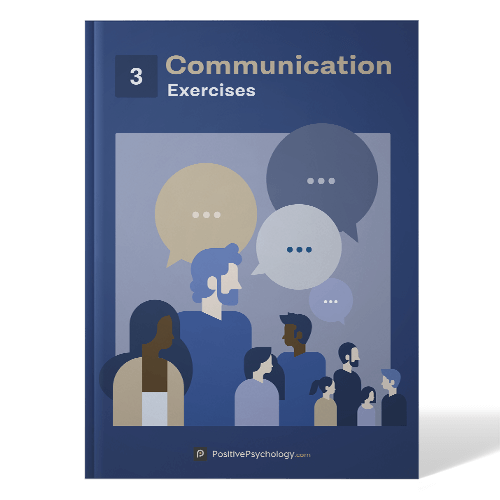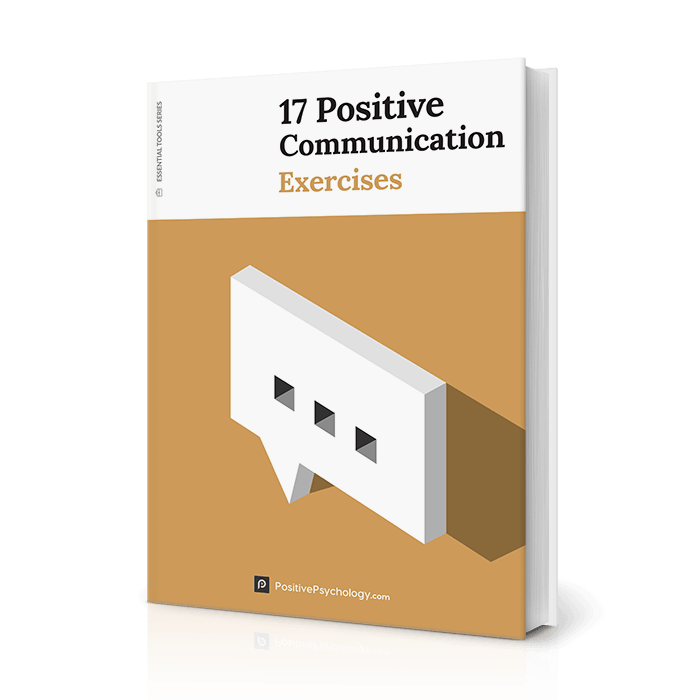

Conflicting goals, motives, and needs can cause stress in any relationship, particularly a romantic one.
While conflict is not uncommon, if left unresolved along with related stress, it can damage the bonds that form between people (Overall & McNulty, 2017).
If we accept that all partners will disagree at times, we must also recognize that it is crucial to find a resolution to ensure that the relationship’s health is maintained (Grieger, 2015).
This article explores conflict and its resolution in couples and other relationships, introducing key strategies and activities to help avoid or recover from any harm done.
Before you continue, we thought you might like to download our three Positive Communication Exercises (PDF) for free. These science-based tools will help you and those you work with build better social skills and better connect with others.
Conflict need not always lead to damage. Challenge and disagreement within a relationship (romantic or otherwise) can encourage growth, deeper understanding, improved communication, and progress toward a goal (Overall & McNulty, 2017; Tatkin, 2012).
But this is not always the case.
The most critical aspect of conflict affecting the health of a relationship is its resolution. There will always be disagreement and differences of opinion of one kind or another. However, to avoid a loss of trust, damage to intimacy, or behavior that further upsets the relationship, “the couple will want to make sure that the resolution does not leave lingering hurt or resentment in one or both of them” (Grieger, 2015, p. 161).
Clinical psychologist Russell Grieger (2015) suggests that disagreements have four possible outcomes:
Undoubtedly, the fourth option is the most ideal for a long-term, healthy partnership and avoids the potential for a downward spiral in the relationship (Grieger, 2015). When in response to conflict, a win–win outcome leads to growth and moving forward.

Grieger (2015) uses a simple yet effective four-step process with couples handling troublesome conflict to overcome resolute differences.
Otherwise, either side is unlikely to listen patiently and openly to what the other is saying.
Once both have a shared understanding, a win–win solution is possible.
The couple can share ideas, hopes, needs, goals, and concerns until finding a solution that satisfies both of them.

These detailed, science-based exercises will equip you or your clients with tools to improve communication skills and enjoy more positive social interactions with others.
Download PDF
By filling out your name and email address below.
Conflict can become an unhealthy habit, leading to a repeating pattern of one or both partners consistently feeling they have lost (Grieger, 2015).
It’s important to consider what brought the couple together in the first place and what they can do more or less of to show their love and understand one another better going forward.
Heading out to work, school, or the store is described as launching, a time when one partner leaves the relationship world for the non-relationship world (Tatkin, 2012).
Launchings and landings (returning to the relationship) can be an opportunity for conflict or the perfect chance to build healthy relationship-building habits.
Ask yourself or your client:
What is right for one couple may not be for the next. It is essential to consider the message sent by each partner’s behavior. An enjoyable farewell and return can, in time, improve connections and reduce the risk of conflict.
Caddell (2013) describes the importance of building a blueprint for love. Conflict often arises from misunderstandings or a failure to consider the other’s needs and wishes.
Understanding what a loving relationship looks like to your partner may make it easier to recognize what upsets or frustrates them.
Use the Blueprint for Love worksheet to reflect on how a relationship’s blueprint for love might look.
The exercise begins by asking the client to think of a couple from their past who had a loving relationship. It may be their parents, or they can choose two other people who showed love, acceptance, and caring for one another. Then the person considers what they are looking for in a relationship.
Conflict is often unavoidable and sometimes outside of our control. However, how we respond to disagreements, harsh words, and arguments is.
Tatkin (2012, p. 155) suggests couples should adopt the “policy never to avoid anything, no matter how difficult.” Not leaving things to fester and returning at a later date requires paying attention to one another and recognizing what is sensitive for the other person.
Aim to discuss and agree on a mutually beneficial outcome as soon as possible after an issue occurs. If that’s not possible, then agree when it can be discussed.
Sometimes couples forget what they saw in each other when they first met. Instead, they become wrapped up in repeating patterns of arguing, disagreements, and conflict.
Revisiting the past can serve as a helpful reminder of what is good about a couple and review why they are together (Williams, 2012).
Ask the couple to consider and discuss the following relationship therapy questions:
Clear, open, and complete dialogue is crucial to a successful relationship and reducing conflict. Sharing and understanding are best achieved when we are not projecting our own beliefs about a partner or what they are going to say but genuinely paying attention to verbal and nonverbal behavior (Hannah, Luquet, Hendrix, Hunt, & Mason, 2005).
Effective listening takes practice. Focus on your partner, what they have to say, and how they act; do not divide attention by looking at your phone or people passing by. Hear what they are saying and how they say it, rather than attending to your own thoughts. And crucially, be comfortable with moments of silence and practice nonjudgment.

The Positive Psychology Toolkit© is a groundbreaking practitioner resource containing over 500 science-based exercises, activities, interventions, questionnaires, and assessments created by experts using the latest positive psychology research.
Updated monthly. 100% Science-based.
“The best positive psychology resource out there!”
— Emiliya Zhivotovskaya, Flourishing Center CEO
We often attempt to avoid or reduce conflict at all costs.
Yet this can lead to any resolution being preferable to none due to the fear or discomfort of conflict.
To break out of the lose–win, win–lose, or lose–lose pattern often experienced in a relationship, each partnership must find their own path to achieving a win–win outcome (Grieger, 2015).
The following couples therapy exercises help to remove obstacles in the way of achieving positive outcomes in order to better understand how to ensure both partners win:

Existing relationship disturbances can negatively affect finding an appropriate conflict resolution.
Ask each partner to complete the Removing Relationship Disturbances worksheet.
The exercise begins by each partner identifying existing disagreements and conflicts in their relationship and the emotional reactions that accompany them.
Couples answer the following:
To help with this exercise, couples can think about times when they experienced hurt, upset, anger, insecurity, and fear.
Next, they consider what they could do to remove such disturbances, being specific. What actions could resolve the problem causing these emotional reactions?
Finding a better outcome to conflict requires adopting a win–win mindset. Grieger (2015) suggests rather than asking yourself, “How can I get what I want?” ask, “How can we get what we want?”
This change in approach requires a commitment from both partners to find solutions to problems that lead to mutual satisfaction.
Ask each partner to complete the Agree to a Win–Win Mindset and sign off on the following:
I, ____________________________, commit to adopting a win–win mindset where I work toward outcomes from current and future disagreements so that we both get what we want and need.
Tell them that to achieve a win–win outcome from conflicts, they need to commit to the mindset that they want to reach satisfactory results from all aspects of their relationship.
Once they have both physically signed up, put the sheet somewhere visible in the house to remind both parties that a new mindset is required throughout the relationship, now and in the future.
To understand what a win means for the other person during conflict or a disagreement, it is essential to listen well, forming a deep understanding of their needs, hopes, fears, and wishes.
Use the Listening With Purpose worksheet to capture what winning looks like for both partners in a relationship before considering the next steps.
The couple should take some time, preferably in a place where they both feel safe and comfortable, to discuss what outcome they would like from the existing disagreement.
Without judgment and allowing each person the opportunity to talk openly, they should be able to share what they want. Remember, there is no right or wrong answer – only a true reflection of needs.
Compromise is essential in any relationship, particularly during conflict. Each partner must consider giving something up of similar value so that they meet somewhere in the middle (Grieger, 2015).
Use the Brainstorming for Synergy worksheet to encourage bouncing ideas off each other until the couple finds a win for both partners.
Capture the following:
Often, resolutions to conflict and disagreement feel like a win to both parties; this is a win–win situation. The couple’s goal should be for mutual satisfaction.
We have regular check-ups for our physical wellbeing, so why not for our relationship health? Without regular monitoring, we don’t know if we are doing things right or wrong for the relationship and avoiding unnecessary conflict.
Grieger (2015) suggests the beginning of the month is a great time to attend to the health of the relationship. Use the Regular Couple Check-Ups worksheet to take stock honestly and openly and make plans for keeping the relationship on track or shake things up a little.
Ask each partner to consider the following questions together or apart:
The check-ups must be approached with an open, win–win mindset. This is not an opportunity to score points, but to perform a relationship health check and move forward in a positive way.
If you’re looking for more tools to help your clients strengthen their relationships, be sure to check out three of our hand-picked exercises from the Positive Psychology Toolkit©, which you can download for free in our 3 Positive Relationships Exercises Pack.
Here’s a quick snapshot of what’s included:
Try out these powerful tools for yourself by downloading the exercise pack today.
Additional reading we recommend includes:
If you’re looking for more science-based ways to help others communicate better, this collection contains 17 validated positive communication tools for practitioners. Use them to help others improve their communication skills and form deeper and more positive relationships.

17 Positive Communication Exercises [PDFs] to help others develop communication skills for successful social interactions and positive, fulfilling relationships.
Created by Experts. 100% Science-based.
Conflict is a natural part of life. While it is not always damaging, it plays an inevitable role in every relationship.
Indeed, “all couples have disagreements. It is impossible to avoid them. It is how they handle them that will make or break their relationship” (Grieger, 2015, p. 164).
While couples should try to avoid a repeating pattern of conflict, when conflict is inevitable, they should seek a solution that leaves neither party feeling unfairly treated, hurt, or angry. If the resolution leaves one person feeling slighted or resentful, it can creep into other areas of the relationship.
A win–win outcome is most likely when we commit to fairness and listen to one another with open minds and hearts. We must use what we hear and what we already know of the other person to work together and find a solution where no one is left feeling they have lost.
While it is essential to avoid unnecessary conflict, it is helpful to develop an environment in which a couple can flourish and adopt a compassionate, trusting outlook that avoids damage or aids healing when conflict is unavoidable.
These strategies, worksheets, and exercises, teamed with the desire to grow and develop as a couple, provide a way to resolve conflict and form deeper bonds.
ReferencesJeremy Sutton, Ph.D., is an experienced psychologist, consultant, and coach. Jeremy also teaches psychology online at the University of Liverpool and works as a coach and educator, specialising in positive psychology, performance psychology, sports psychology, and strength-based psychology.

Share this article:
How do you stop the argument from going on and on and on when you’re both feeling tired, hungry or unwell? But struggle to say what you really feel and then it boils over into an argument? How do you stop it before it gets worse and worse and there is yelling? Reply
Julia Poernbacher, M.Sc. on September 8, 2024 at 13:24Hi Brooke, It sounds like you’re dealing with a very common and frustrating situation. When both people are tired, hungry, or unwell, emotions can escalate quickly. A helpful approach is to pause the conversation before it spirals. You could try saying something like, “I think we’re both not in the best place to talk about this right now. Can we take a break and revisit it when we’re feeling better?” This helps acknowledge the situation without invalidating feelings and can prevent things from boiling over. Taking care of basic needs (like eating or resting) can make a huge difference in how you both communicate. I hope this helps! Warm regards,
Julia | Community Manager Reply
Thank you for this beautiful article. What happens when the other party don’t want to communicate but wants some space. Reply
Caroline Rou on March 9, 2023 at 11:32Hi Edosa, Thanks for your question. Sadly, we do not have any control over the way that others choose to communicate with us. We do, however, have full agency over the way that we act in response to another person’s communication style. It’s important to remember that a conversation probably won’t be very productive if the parties involved have different needs at that moment, so it is probably best to wait until everyone involved is ready to discuss. I hope this helps! -Caroline | Community Management Reply
Jess on May 6, 2023 at 14:44In my relationship, I like to resolve things quickly, but my partner tends to push things off and never takes the initiative to start these conversations. It leaves me feeling resentful, even though I want to respect his desire to take space. How is a good way of addressing this? Reply
Julia Poernbacher on May 10, 2023 at 16:31Dear Jess, It’s understandable that you’re feeling frustrated in this situation. Communication is crucial in any relationship, and it can be challenging when the ways you and your partner handle conflicts differ. Here are a few suggestions that might help: – Express your feelings: Start by letting your partner know how you’re feeling, using “I” statements to avoid sounding accusatory. For instance, you might say, “I feel a bit upset when we don’t resolve our disagreements promptly, and it often leaves me feeling resentful.”
– Understanding each other’s needs: It’s important to understand that people have different ways of processing emotions and conflicts. Your partner might need more time to think things through, while you might prefer addressing issues immediately. Discuss these differences openly and try to understand each other’s needs.
– Find a compromise: Based on your understanding of each other’s needs, try to find a middle ground. Perhaps you could agree to give your partner some space to process, but they also agree to initiate a conversation about the issue within a certain timeframe.
– Seek professional help: If these conversations are difficult or if you can’t seem to find a compromise, you might find it helpful to seek guidance from a relationship counselor. Remember, it’s perfectly normal for couples to have different conflict resolution styles. The key is to communicate openly, understand each other’s needs, and find a compromise that works for both of you. Best of luck,
Julia | Community Manager Reply
Please help me my marriage is divorced before 1 year.i have very regret.so how I can be resolved.the problem Reply
Nicole Celestine, Ph.D. on December 24, 2021 at 05:15Hi Alemnesh, I’m sorry to hear you’re feeling regret. Have you considered speaking with someone, perhaps a coach, therapist, or even a good friend, about your feelings surrounding the relationship? Of course, what to do next largely depends on the circumstances surrounding the end of the relationship, but perhaps sharing your concerns with someone you can trust may give you some insight or encouragement to help you move forward, whether that means looking to move on or trying to rekindle the relationship. I wish you all the best. – Nicole | Community Manager Reply